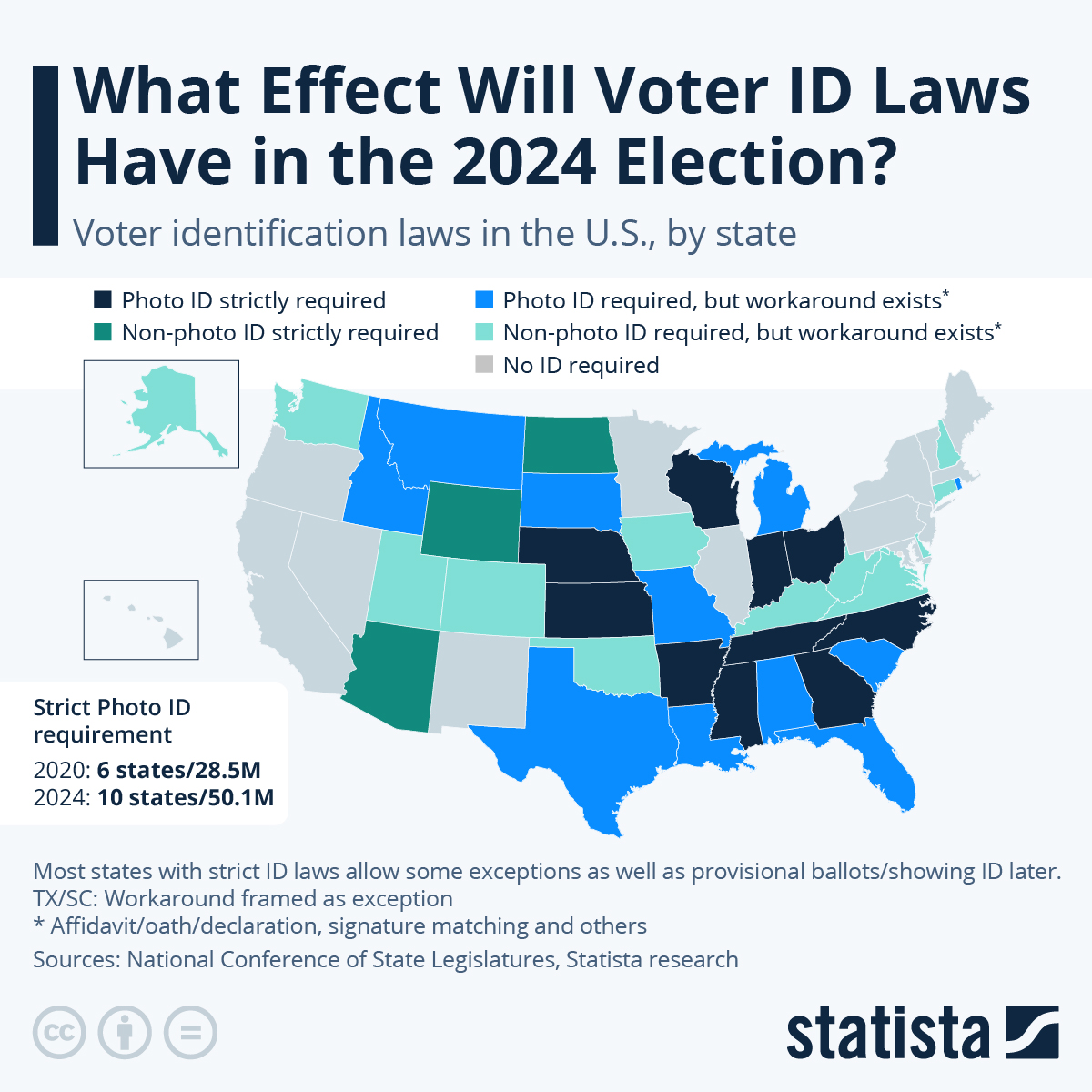
Since the last presidential election in the United States, four states have implemented strict photo ID laws at the polls, bringing the count of places with these types of laws to 10. Additionally, three more states have made their ID laws stricter and in one state, such a change was blocked by courts.
Around 29 million Americans of voting age live in states where voter ID laws were tightened, while the number of those living under strict photo ID requirements rose from fewer than 30 million to more than 50 million. Research by the University of Maryland shows that as of the fall of 2023, almost 50 million Americans or around 20 percent of adults citizens were estimated to not have a valid driver's license or at least not one with their current name or address on it, among them 23 million Democrats, 15.7 million Republicans and 10.5 million Independents.
As Statista's Katharina Buchholz details below, combining these numbers means that around 10 million voting-age adults could be negatively affected by photo ID laws in November 2024.
You will find more infographics at Statista
Other research, however, shows that party mobilization and outreach have successfully compensated for these negative effects on voter turnout in the past.
Voter ID laws, specifically those strictly requiring photo ID, are a contentious topic.
While proponents say that bringing official and easy-to-verify identification on election day should be a no-brainer, the lack of a uniform national ID system in the U.S. means that some people do not have a photo ID. This most often affects poor and otherwise marginalized people as well as people of color, which has led to the topic of voter ID having become a partisan one in the country.
Most states that currently have strict photo ID law for voting are in the Southern United States or the Midwest. New laws were passed in the last four years in Nebraska, Arkansas, North Carolina and Ohio, while they have existed for longer in Georgia, Mississippi and Tennessee, among other. A bigger group of states requests photo ID at the polls, but voters without it can use a workaround, for example signing a sworn affidavit or other document or have their signature matched by a clerk. Even states with strict photo ID laws mostly allow voting a provisional ballot and bringing in ID by a specific deadline as well as some exception in case voters have specific impairments, objections on religious grounds or others.
In Texas and South Carolina, this line between exception and workaround has been increasingly blurred, showing the tug-of-war that surrounds U.S. voter ID laws. Voters in both states who do not have photo ID can fill out a reasonable impediment declaration. While this sounds like voters will need to prove that they qualify for an exception, the cause can be any "obstacle you find reasonable", the South Carolina Election Commission informs. In Texas, the situation is similar.
Since the last presidential election in the United States, four states have implemented strict photo ID laws at the polls, bringing the count of places with these types of laws to 10. Additionally, three more states have made their ID laws stricter and in one state, such a change was blocked by courts.
Around 29 million Americans of voting age live in states where voter ID laws were tightened, while the number of those living under strict photo ID requirements rose from fewer than 30 million to more than 50 million. Research by the University of Maryland shows that as of the fall of 2023, almost 50 million Americans or around 20 percent of adults citizens were estimated to not have a valid driver’s license or at least not one with their current name or address on it, among them 23 million Democrats, 15.7 million Republicans and 10.5 million Independents.
As Statista’s Katharina Buchholz details below, combining these numbers means that around 10 million voting-age adults could be negatively affected by photo ID laws in November 2024.
You will find more infographics at Statista
Other research, however, shows that party mobilization and outreach have successfully compensated for these negative effects on voter turnout in the past.
Voter ID laws, specifically those strictly requiring photo ID, are a contentious topic.
While proponents say that bringing official and easy-to-verify identification on election day should be a no-brainer, the lack of a uniform national ID system in the U.S. means that some people do not have a photo ID. This most often affects poor and otherwise marginalized people as well as people of color, which has led to the topic of voter ID having become a partisan one in the country.
Most states that currently have strict photo ID law for voting are in the Southern United States or the Midwest. New laws were passed in the last four years in Nebraska, Arkansas, North Carolina and Ohio, while they have existed for longer in Georgia, Mississippi and Tennessee, among other. A bigger group of states requests photo ID at the polls, but voters without it can use a workaround, for example signing a sworn affidavit or other document or have their signature matched by a clerk. Even states with strict photo ID laws mostly allow voting a provisional ballot and bringing in ID by a specific deadline as well as some exception in case voters have specific impairments, objections on religious grounds or others.
In Texas and South Carolina, this line between exception and workaround has been increasingly blurred, showing the tug-of-war that surrounds U.S. voter ID laws. Voters in both states who do not have photo ID can fill out a reasonable impediment declaration. While this sounds like voters will need to prove that they qualify for an exception, the cause can be any “obstacle you find reasonable”, the South Carolina Election Commission informs. In Texas, the situation is similar.
Loading…





